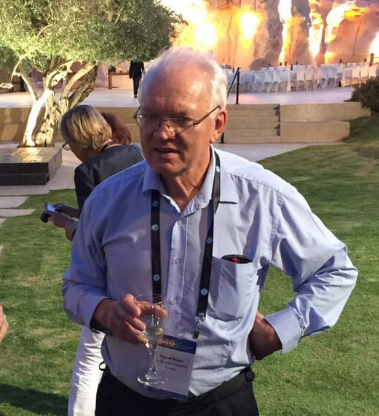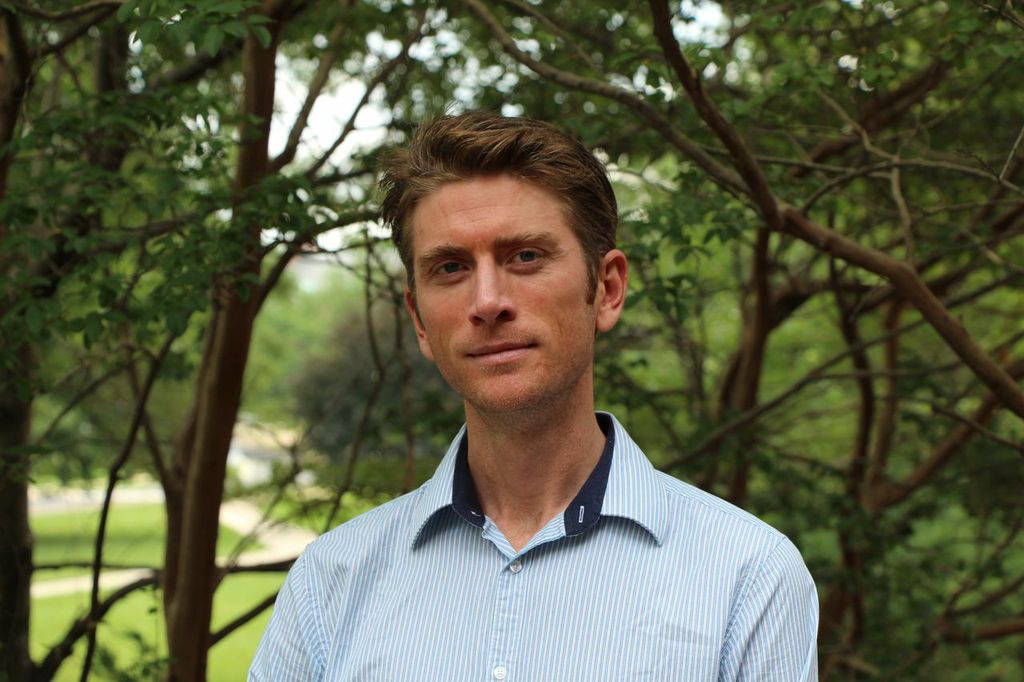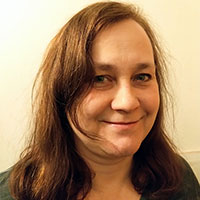Program:
Opening address:
- Professor Richard Morgan
Presentation 1:
- "Investigating hypersonic boundary-layer transition using high-speed visualization techniques" by Associate Professor Stuart Laurence, University of Maryland, USA
Presentation 2:
- "Spontaneous ignition of aluminum particles in a shock tube environment" by Dr Marianne Omang, Norwegian Defence Estate Agency (NDEA), Norway
Timed Program:
| start time in AEST | running time (start - finish) | ||
| Tue 07 Dec 05:00 | 0:00 - 0:15 | Opening remarks by Professor Richard Morgan and house keeping | |
| Tue 07 Dec 05:15 | 0:15 - 1:20 | Talk 1: Investigating hypersonic boundary-layer transition using high-speed visualization techniques | Associate Professor Stuart Laurence |
| Tue 07 Dec 06:20 | 1:20 - 2:25 | Talk 2: Spontaneous ignition of aluminum particles in a shock tube environment | Dr Marianne Omang |
| Tue 07 Dec 07:25 | 2:25 - 2:30 | Closing remarks |
About the Presenters:
Professor Richard Morgan
 Richard Morgan came to Brisbane in 1980 to work on Australia’s first Scramjet project with Pioneering Professor Ray Stalker, the founder of the UQ Hypersonics group.
Richard Morgan came to Brisbane in 1980 to work on Australia’s first Scramjet project with Pioneering Professor Ray Stalker, the founder of the UQ Hypersonics group.
Since that time he has worked actively in hypervelocity ground facility development in the form of expansion tubes and shock tubes, and on a range of topics in high speed aerothermodynamics. He initiated the ‘Mechanical and Space Degree’ in 1994, which subsequently transformed to the ‘Mechanical and Aerospace’ degree currently offered at UQ. He was the founding Director of UQ’s Centre for Hypersonics in 1997 and served in that role until October 2021.
Associate Professor Stuart Laurence
 Stuart Laurence is currently an Associate Professor in the Department of Aerospace Engineering at the University of Maryland (UMD). He received his Ph.D. from the Graduate Aeronautical Laboratories of the California Institute of Technology in 2006. From 2009, he was employed as a scientific researcher at the German Aerospace Center (DLR), Goettingen, before joining the faculty at UMD in 2013. His research interests, which are primarily experimental in nature, encompass a range of problems within the general area of high-speed flows, including boundary-layer transition to turbulence, shock-wave/boundary-layer interactions, fluid-structure interactions, multi-body separation, supersonic combustion, and high-altitude flow measurements. A particular focus of his work is the use of high-speed visualization techniques to enhance our understanding of these problems.
Stuart Laurence is currently an Associate Professor in the Department of Aerospace Engineering at the University of Maryland (UMD). He received his Ph.D. from the Graduate Aeronautical Laboratories of the California Institute of Technology in 2006. From 2009, he was employed as a scientific researcher at the German Aerospace Center (DLR), Goettingen, before joining the faculty at UMD in 2013. His research interests, which are primarily experimental in nature, encompass a range of problems within the general area of high-speed flows, including boundary-layer transition to turbulence, shock-wave/boundary-layer interactions, fluid-structure interactions, multi-body separation, supersonic combustion, and high-altitude flow measurements. A particular focus of his work is the use of high-speed visualization techniques to enhance our understanding of these problems.
Dr Marianne Omang
 Dr Marianne Omang is a senior researcher working for the Norwegian Defence Estate Agency (NDEA) in their R&D Section. In 2005 Dr Omang completed her PhD from the Institute of Theoretical Astrophysics (ITA) at the University of Oslo. Dr Omang also has a part time position as an Associate Professor at ITA.
Dr Marianne Omang is a senior researcher working for the Norwegian Defence Estate Agency (NDEA) in their R&D Section. In 2005 Dr Omang completed her PhD from the Institute of Theoretical Astrophysics (ITA) at the University of Oslo. Dr Omang also has a part time position as an Associate Professor at ITA.
In the last years the focus of Dr Omang’s work has been on multi-phase problems including shock interaction with inert and reactive particles. Together with her colleagues she has spent quite some time on planning and building up a Laboratory facility for studies of shock and blast waves. A wide range of different experiments are performed here, including phenomena related to ignition and burning of reactive particles both in a shock tube environment as well as in additives of high explosives.
The experimental work is supplemented by numerical simulations using their in-house code Regularized Smoothed Particle Hydrodynamics (RSPH). They have recently extended our code to include a multiphase description and various particle combustion models.
About International Colloquium on Shock Waves (ICSW)
The ICSW consists of three separate plenary events between 6 and10 December 2021. These events have been scheduled at different times of the day such that at least two sessions should occur at convenient times for participants in all parts of the world.
Each session is three hours in duration and includes two plenary presentations from research leaders in the shock waves community. Session 2 will include a virtual facility tour of the hypersonic wind tunnel facilities at The University of Queensland, and Session 3 will include an awards ceremony from the International Shock Wave Institute (ISWI).
The timing of the three sessions can be seen below, along with links to the pages for each separate plenary event. Please register for the sessions which you are interested in attending so that you can add them to your calendar and receive reminders closer to the date.
All sessions will occur on Zoom and are free of charge. Prior registration on Zoom is recommended to receive updates and to avoid missing out if sessions reach capacity.
The ICSW website link can be found here.
| Session 1 Start | Session 1 Finish | Session 2 Start | Session 2 Finish | Session 3 Start | Session 3 Finish | |
| Brisbane (AEST, UTC+10) | Tue 07 Dec 05:00 | Tue 07 Dec 08:00 | Wed 08 Dec 13:00 | Wed 08 Dec 16:00 | Fri 10 Dec 22:00 | Sat 11 Dec 01:00 |
| Sydney (AEDT, UTC+11) | Tue 07 Dec 06:00 | Tue 07 Dec 09:00 | Wed 08 Dec 14:00 | Wed 08 Dec 17:00 | Fri 10 Dec 23:00 | Sat 11 Dec 02:00 |
| Tokyo and Seoul (JST and KST, UTC +9) | Tue 07 Dec 04:00 | Tue 07 Dec 07:00 | Wed 08 Dec 12:00 | Wed 08 Dec 15:00 | Fri 10 Dec 21:00 | Sat 11 Dec 00:00 |
| Beijing and Singapore (CST and SGT, UTC+8) | Tue 07 Dec 03:00 | Tue 07 Dec 06:00 | Wed 08 Dec 11:00 | Wed 08 Dec 14:00 | Fri 10 Dec 20:00 | Fri 10 Dec 23:00 |
| New Delhi (IST, UTC + 5:30) | Tue 07 Dec 00:30 | Tue 07 Dec 03:30 | Wed 08 Dec 08:30 | Wed 08 Dec 11:30 | Fri 10 Dec 17:30 | Fri 10 Dec 20:30 |
| Moscow (MSK, UTC +3) | Mon 06 Dec 22:00 | Tue 07 Dec 01:00 | Wed 08 Dec 06:00 | Wed 08 Dec 09:00 | Fri 10 Dec 15:00 | Fri 10 Dec 18:00 |
| Johannesburg (SAST, UTC +2) | Mon 06 Dec 21:00 | Tue 07 Dec 00:00 | Wed 08 Dec 05:00 | Wed 08 Dec 08:00 | Fri 10 Dec 14:00 | Fri 10 Dec 17:00 |
| Paris, Berlin and Oslo (CET, UTC+1) | Mon 06 Dec 20:00 | Mon 06 Dec 23:00 | Wed 08 Dec 04:00 | Wed 08 Dec 07:00 | Fri 10 Dec 13:00 | Fri 10 Dec 16:00 |
| London (GMT, UTC +0) | Mon 06 Dec 19:00 | Mon 06 Dec 22:00 | Wed 08 Dec 03:00 | Wed 08 Dec 06:00 | Fri 10 Dec 12:00 | Fri 10 Dec 15:00 |
| New York (EST, UTC-5) | Mon 06 Dec 14:00 | Mon 06 Dec 17:00 | Tue 07 Dec 22:00 | Wed 08 Dec 01:00 | Fri 10 Dec 07:00 | Fri 10 Dec 10:00 |
| Dallas (CST, UTC-6) | Mon 06 Dec 13:00 | Mon 06 Dec 16:00 | Tue 07 Dec 21:00 | Wed 08 Dec 00:00 | Fri 10 Dec 06:00 | Fri 10 Dec 09:00 |
| Los Angeles (PST, UTC-8) | Mon 06 Dec 11:00 | Mon 06 Dec 14:00 | Tue 07 Dec 19:00 | Tue 07 Dec 22:00 | Fri 10 Dec 04:00 | Fri 10 Dec 07:00 |
